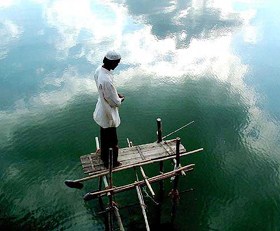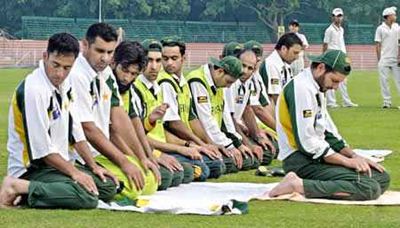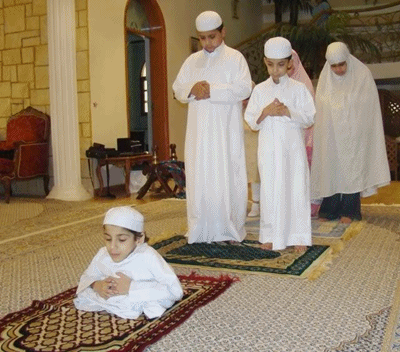Prayers
in Islam, Part-6
- Gheyas S
Mahfoz Hashmi, Jeddah
(hgheyas@savola.com)
……. Continued from previous issues.
In May 2010 issue we have precisely described about the importance of
sincerity in prayers (Nimaz) as all worship and prayers at top of them
must be performed in accordance with Quran & Sunna (outer
sincerity) keeping the heart and attention towards Allah (inner
sincerity). All worship will be weighted by Allah with these two
traits.

Let us discuss
here importance of performing obligatory prayers in Mosque. Five-time
obligatory prayers (17 Rak’at / day) for men should always be in
congregation at mosque. If any of them missed in congregation at mosque
without any legal justification its performance will not compensate the
missing. Although among most of the scholars obligatory prayers in
congregation at Mosque is Confirmed Sunnah it is Wajib among Tabaye
scholars (Atta, Hassan Basri, Awzayi and Abu Thour), and also according
to Imam Ahmad, Ibn Khuzaimah, Ibn Habban and Saudi scholars Bin Baz and
Othaiman. That is why there is no evidence of second congregation of
obligatory prayer in Mosque from the prophet (S) and his companions
(R). Imam Zarkashi has reported in his book (Elamussajid
Be-EhkamulMasajid) that there was no evidence of second obligatory prayers at
Mosque before 7th century. Let us see how our prophet (S) and his
companions see the missing of congregation in Masque. The
prophet (S) says:
"I think I order the prayer to
be established. Then, I go to the houses of those who are not present
in the congregational prayers and burn them together with their
houses." (Muttafaq Alaih at the authority of Abu Hurairah)
There
is a highly authentic Hadith in which one of the companions, Abdullah
bin Um-Makhtoom says he has requested the prophet (S) if he can pray at
home as he is weak, his eye-sight has defects and he is living far away
from mosque. In addition, there is a garden and a valley between home
and mosque. The prophet asked him ,"Does he hear calls of
prayer(Aazan)?". He replied in affirmative. The prophet said," Respond
to it".

|

When
our prophet (S) orders his companion, who is physically feeble and on
top of that there are garden and valley between his home and mosque, to
attend prayers in mosque, what would be the fate of today's healthy
Muslims who have been negligent of it. Once, Caliph Omar (R) went to
the house of a person who did not report for prayers at
mosque. He asked him the reason for not coming to the mosque.
He replied he was sick and if he had not heard his voice, he would not
have come out of the house. Omar told him he did not heed to the call
that is more important than his call. He stated people must ensure
their attendance to the mosque. Otherwise, he will send some
people to drag them to Mosque holding their necks.
It is the Fatwa of Sahaba Ibn Masud (R) and Sahabah Abu Ashari (R) that
obligatory prayers that performed in places after hearing the Aazan in
other than Mosque without legal justification were invalid. Also
according to Hazrat Hassan bin Ali (R) that obligatory prayers of those
who have heard Aazan and not reported to Mosque don’t go above their
head. As per Hazrat Ali (R) the prayer of neighbour of the Mosque is in
that neighbourhood Mosque only.
Now, let us think coolly and conscientiously that warning is available
for those who pray but at home. What about those who have been ignorant
of performing prayers.
….… to be continued.

---------------------------------------------------------------------
Khuda ne aaj tak us qaum ki haalat naheen badlee
na ho jisko
khyal aap apni haalat ke badalne ka
---
Allama Iqbal
mita de apni
hasti ko gar koi martaba chahe
ke dana khak
mein he milkar gule gulzar hota hain
---
Allama Iqbal
Yaqeen mahkam, amal paiham,
Mohabbat
fateh-i-alam;
Jehad-e-zindgani
men
Hain yeh mardon
kee shamsheeren.
---
Allama Iqbal
Dil se jo baat nikalti hain , asar rakhti hai ,
Par nahi taqat-
e- Parwaaz magar rakhti hai ...
Ki Mohammed se
wafa Tune to hum tera hain
Yeh jahen cheez
hain kya' lau - wo- kalam tera hain
---
Allama Iqbal
|

 Download pdf (1.9 mb)
Download pdf (1.9 mb)

 Download pdf (1.9 mb)
Download pdf (1.9 mb)